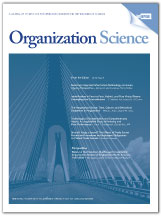Academic articles
Practitioner articles
Working papers
Books
Book chapters
Case studies
Other publications
Subject(s)
Human resources management/organizational behavior; Strategy and general management
Keyword(s)
Error management
Journal Pages
82–86
Subject(s)
Technology, R&D management
Volume
2014
Journal Pages
24–35
Subject(s)
Product and operations management
Keyword(s)
Maintenance repair, service contracting, co-production, empirical operations management, service chain value, healthcare industry
View all ESMT Working Papers in the ESMT Working Paper Series here. ESMT Working Papers are also available via RePEc, EconStor, and the German National Library (DNB).
Pages
32
ISSN (Print)
1866–3494
Subject(s)
Information technology and systems; Strategy and general management
Keyword(s)
Taking charge, Chief Information Officer, new appointment, transition, leader socialization, executive integration, IT leadership
Volume
13
Journal Pages
159–173
Subject(s)
Economics, politics and business environment
Keyword(s)
Broadband, market definition, multinomial logit, mixed logit
JEL Code(s)
L13, L43, L93
This paper uses a rich survey of 6446 households in Slovakia to estimate price elasticities of demand for Internet access, and draw implications for market definition. We estimate a mixed logit model, in which households choose between different broadband technologies: DSL, cable modem, fibre, WiFi and mobile. We find that a number of household characteristics influence the technology choices, and there is also significant unobserved heterogeneity. Demand for Internet access is highly price sensitive. The price elasticity of demand for DSL is −3.02, which falls in the middle of the range of elasticities for the other technologies. Furthermore, the price elasticity of demand at the level of all fixed broadband technologies (DSL + cable modem + fibre + WiFi) is equal to −1.98. For a reasonable range of profit margins, this estimate implies that mobile broadband should be included in the relevant antitrust market of fixed broadband. Our findings have implications for competition policy in Central and Eastern European countries where due to poor copper networks mobile broadband is an important alternative to fixed broadband.
Volume
28
Journal Pages
39–56
Subject(s)
Entrepreneurship; Technology, R&D management
Keyword(s)
social networks; organizational form; organizational structure; innovation; network analysis; sociology of
science
This paper draws attention to a new dimension of organization, the semiformal organization, and it reveals how the allocation of different membership forms can render knowledge-intensive organizations more flexible and exploratory in their knowledge creation efforts without sacrificing the functions stably enacted via the formal organization. Most knowledge-intensive organizations seek to create new spaces for collaborations through formally prescribed departments and divisions or through serendipitous, emergent, informal associations (i.e., the formal and informal organization). However, organizations also strategically manage what we call the “semiformal organization” to guide the creation of new work relations and encourage innovation. These secondary memberships are organizationally sponsored and directly related to the organizations’ core research functions, but they are voluntarily joined. As such, they are distinct from formal and informal memberships. On the basis of extensive longitudinal analyses of research initiatives at Stanford University, we find that the semiformal organization provides a compelling channel through which organizations can shape employees’ collaborations and overall productivity.
© 2014 INFORMS
Volume
25
Journal Pages
1306–1324
Subject(s)
Marketing
Keyword(s)
Theory development, unit of analysis, consumer acculturation, nostalgia, consumption culture
JEL Code(s)
M31
Volume
42
Journal Pages
255–259
Subject(s)
Strategy and general management
Keyword(s)
Competitive advantage, tipping point, disruptive innovation, strategic innovation, business model, business model innovation, differentiation, first-mover advantage, new market space, online banking, peer to peer, UK banking industry, value innovation, Zopa
Launched in early 2005, Zopa is a peer-to-peer online brokerage that couples British residents who want to lend with those who want to borrow. The company represents a new business model in the retail financial services industry, and since Zopa is not technically a bank and does not lend money itself, the capital requirements to run the business are relatively small. Compared to a traditional full service bank Zopa concentrates on only a few steps of the value chain. This case study provides an overview of how Zopa, a value innovator, has developed a unique position in the market through an innovative business model. This case enables students to develop a good understanding of the elements of a value innovation and how technologies have the potential to shake up an established industry structure and its key players. Students also get to discuss the sustainability of competitive advantage in a business in which network effects play an important role. Finally, the case can be used to address the topic of how incumbent firms should respond to innovative new business models.
The case helps students to develop a deeper understanding of the concepts of positioning, value innovation, sustainable competitive advantage, and responding to new market entrants. It is intended for MBA courses in strategic management, innovation, and marketing and can also be used in executive education programs as part of a competitive strategy program to discuss issues related to positioning, value innovation, and sustainable competitive advantage. The case is especially suitable for financial services managers in traditional retail or online banking facing the threat of market entry by low-cost or more focused firms.
| buy now | buy now | buy now |
Subject(s)
Strategy and general management
Keyword(s)
Feed-in tariff, decentralized energy generation, German Energiewende, prosumer energy emotionalization
Secondary Title
Distributed generation and its implications for the utility industry
Pages
49–74

